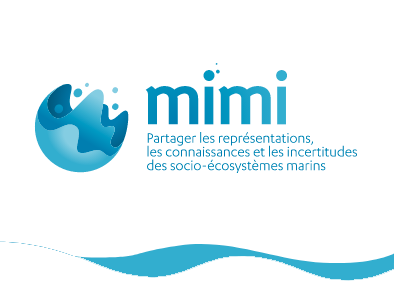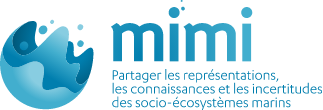Models, Imaginations, and Uncertainties (MIMI)
The complexity of marine socio-ecosystems (MSES), combined with observations that are often indirect and incomplete, leads to representations of MSES that are very far removed from how they actually function. The acceptability of MSES models as decision-making tools depends on the acceptance by the various stakeholders of the description of the socio-ecosystem provided by these tools.
Identifying convergences and integrating divergences into the representation (model) of the MSES as a form of uncertainty in the modeling process is an essential prerequisite for co-constructing evolution scenarios with these models and using them to support policy decision-making. This structural uncertainty adds to the uncertainties more traditionally identified and propagated in models, such as estimation or observation uncertainty. These uncertainties are rarely presented to stakeholders; however, they should be an integral part of the decision-making process, and communicating the accuracy and robustness of diagnoses ensures the transparency and credibility of scientific advice. The dilemma is that emphasizing uncertainty is an effective way to cast doubt on a claim and justify inaction; concealing it amounts to asserting certainties and allows a partisan position to be imposed.
MIMI : A participatory science-society project
The MIMI (Models, Imaginaries, and Uncertainties) project, funded by the scientific department of Ifremer (AMI Sciences in Society), aims to contribute to resolving this dilemma. It aims to share representations, knowledge, and uncertainties about marine socio-ecosystems between fisheries stakeholders and scientists. This exchange should help enrich scenarios for the evolution of marine socio-ecosystems derived from complex models and develop relevant communication materials for their dissemination. In this project, we will seek to answer the following questions: How can we integrate qualitative forms of knowledge and uncertainty derived from the perception and expertise of stakeholders into models? What role should uncertainty play in communicating scientific results to stakeholders in the fisheries sector and, more generally, to society? Should we forgo reporting the uncertainties inherent in our work to make it communicable and usable by stakeholders? How can we communicate uncertain results?
An innovative methodology
Our methodology is based on two workshops bringing together participants from the National Committee for Marine Fisheries and Aquaculture (CNPMEM) and IFREMER. The ISIS-Fish model will be used to illustrate and discuss how to take uncertainty into account in the modeling approach. The artists (authors, directors, performers, musicians, photographers) partnering with the project used the knowledge shared during these workshops as raw material for artistic productions intended for the general public.
The products resulting from the workshops, intended for scientists, fishing professionals, and society, included:
I) a booklet presenting the participatory approach to modeling marine socio-ecosystems without obscuring uncertainties: open the booklet
II) a booklet presenting the participatory approach to selecting common graphic tools for presenting the uncertainties and scenarios provided by the marine socio-ecosystem model: open the booklet
III) as well as artistic productions including theatrical performances, sound creations, and a photographic exhibition: open the booklet (in French).


